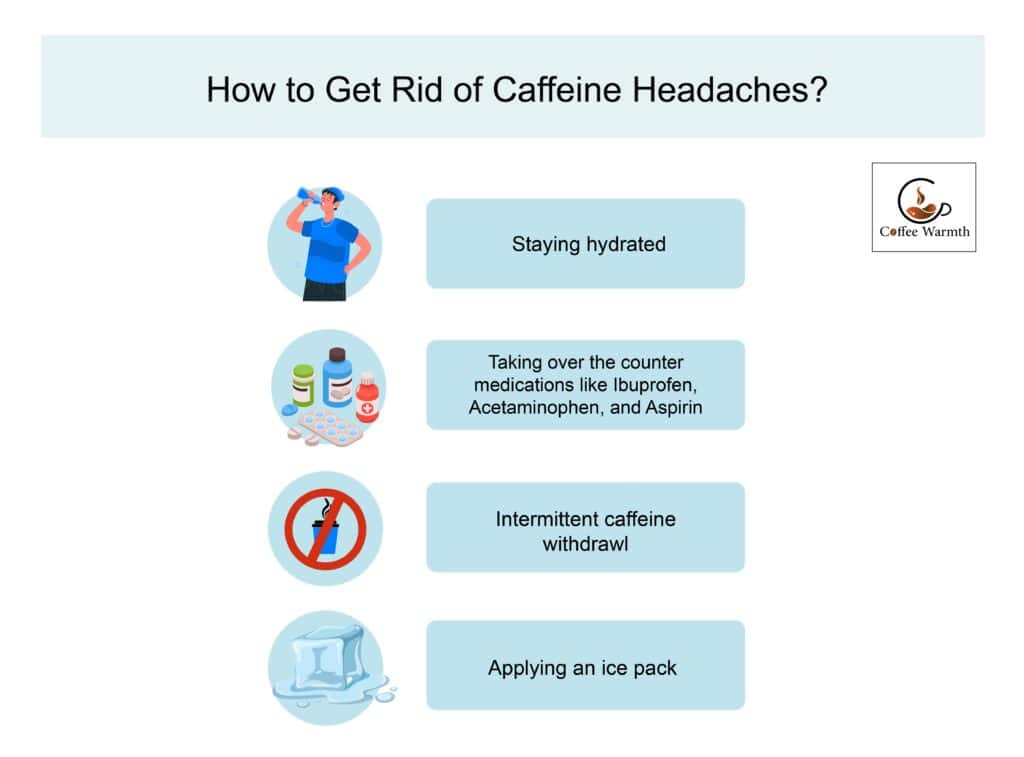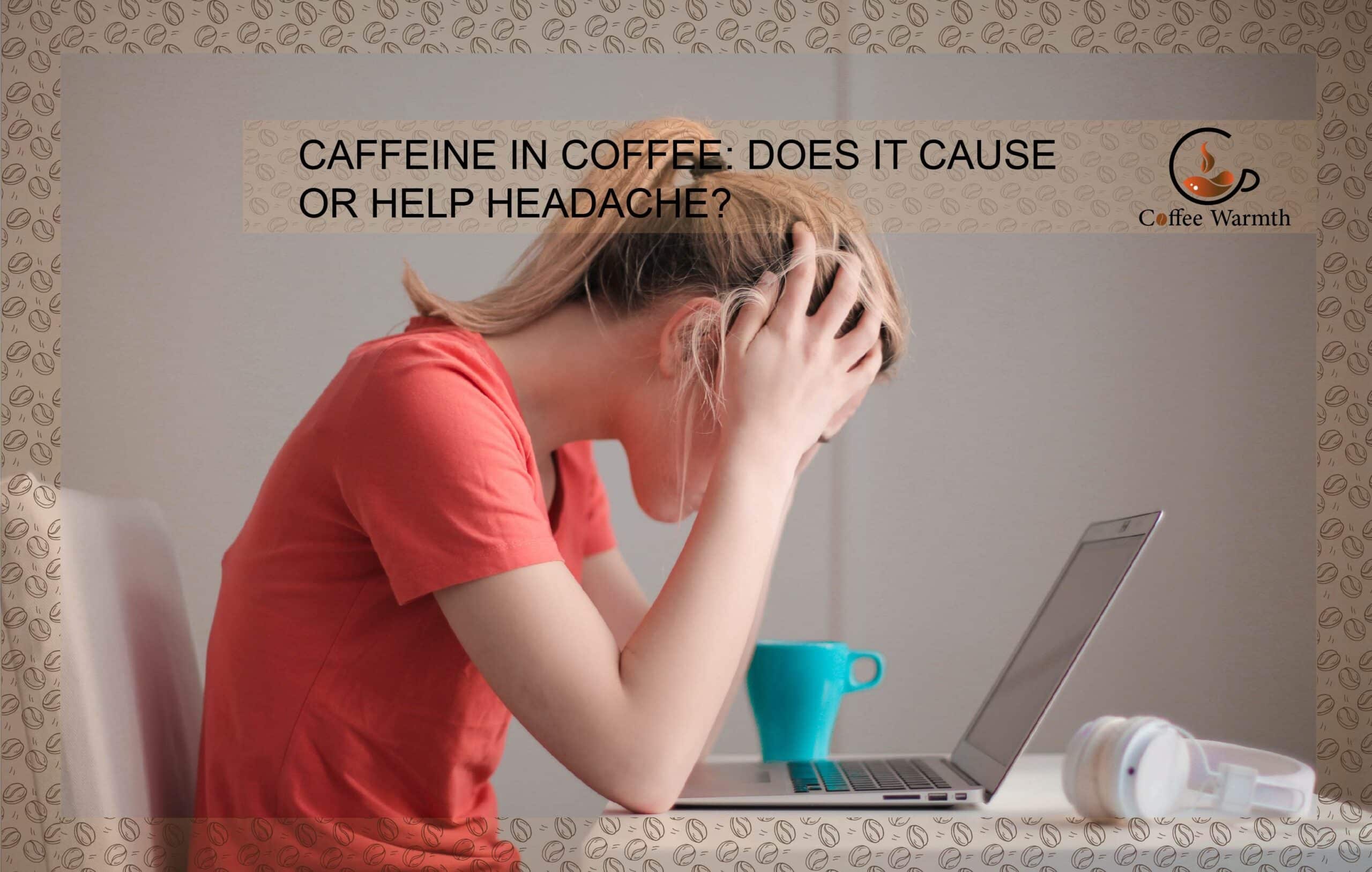Caffeine in drinking coffee can both cause and help with headaches. It is the factor that determines whether coffee will cause or relieve the headache. Caffeine is a central nervous system stimulant that exerts its effects on headache by blocking adenosine from attaching to its receptors.
Drinking coffee can cause four types of headaches namely; caffeine withdrawal headache, caffeine analgesic overuse headache, coffee overconsumption headache, and caffeine induced migraine. Out of these, the most common type is caffeine withdrawal headache. It occurs when a regular caffeine consumer abruptly stops drinking coffee.
Drinking coffee, on the other hand, also helps in reducing the intensity of certain headaches. A cup of coffee with an over the counter analgesic reduces these headaches. Richard B.Lipton, M.D, Professor of Neurology at the Albert Einstein College of Medicine states that 130 mg caffeine equal to 10 fl.oz coffee enhances the analgesic effects of ibuprofen reducing pain of migraine and tension type headache.
In order to get rid of other types of headache, you can follow other tips like staying hydrated, following intermittent caffeine withdrawal, taking over the counter medications, or waiting for caffeine effects to wear out in case of coffee overconsumption headache.
How Does Coffee Cause Headaches?
Coffee causes headaches in several ways depending on the type of headache. Drinking coffee triggers caffeine withdrawal headache, caffeine analgesic overuse headache, coffee overconsumption headache, and caffeine induced migraine.
Caffeine withdrawal headache occurs after you abruptly cease caffeine consumption. If you have been consuming >200 mg/day for at least 2 weeks in the shape of coffee, tea, or any other caffeinated beverage, stopping it altogether will cause withdrawal symptoms within 24 hours.
Caffeine in coffee blocks adenosine and causes vasoconstriction in the cerebral blood vessels. The vasoconstriction reduces blood flow and decreases pressure on the surrounding nerve decreasing headache pain. However, stopping coffee consumption will have an opposite effect. Adenosine will bind to its receptors and cause headache by vasodilation of brain blood vessels. Vasodilation increases blood flow and raises pressure on the surrounding brain nerves. The raised pressure on the brain nerves send pain signals causing headache. Researchers from Radboud University Nijmegen performed a study on regular coffee consumers drinking >2 cups of coffee or 200 mg caffeine daily. The participants abruptly ceased caffeinated coffee consumption and shifted to decaf coffee. The results showed severe caffeine withdrawal headache symptoms which lasted 48-72 hours after shifting to decaf coffee.
The image below shows how does drinking coffee leads to caffeine withdrawal headache.
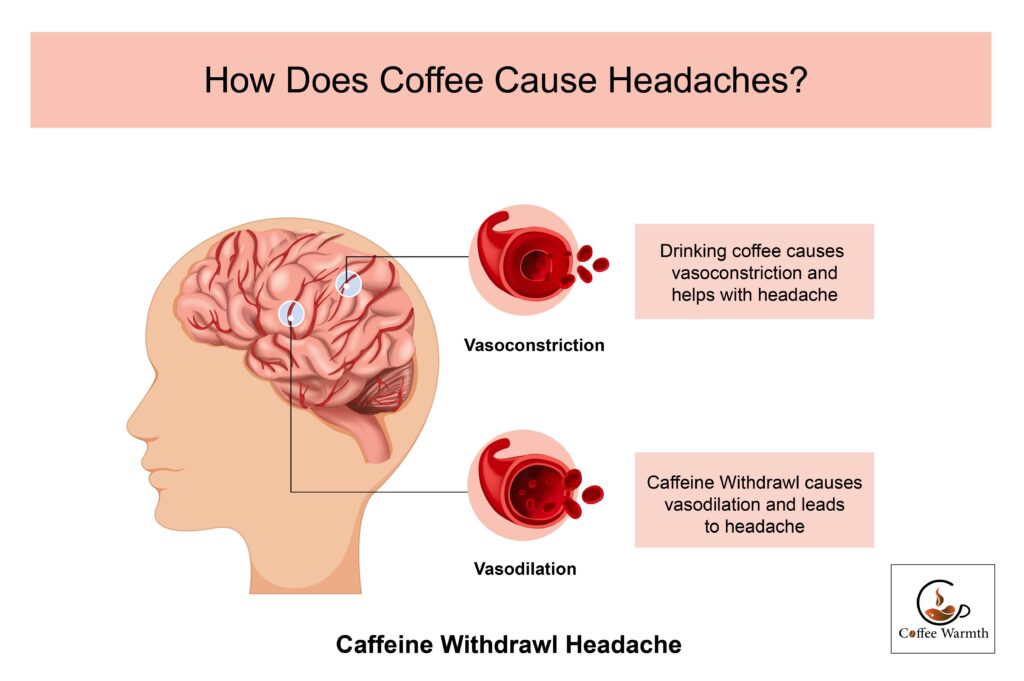
Drinking more than 4-5 cups (32-40 fl.oz.) of coffee or 400 mg caffeine can cause overconsumption headaches. Ann Scher PhD, from Uniformed Services University, found that high coffee consumption caused chronic daily headaches in individuals younger than 40 years. Another study published in the International Journal of Epidemiology done on 4558 Australians found that those drinking 4-5 cups (32-40 fl.oz.) daily had a 1.3 times higher chance of having a headache compared to non-coffee drinkers.
The potency of caffeine in coffee to cause an analgesic overuse or rebound headache is more than its potency as a natural analgesic. Drinking >4 cups (>32 fl.oz.) in long-term causes pathophysiological changes in the central and peripheral nervous system. Since caffeine in coffee is a central nervous system stimulant, long-term stimulation leads to brain hyperexcitability and release of pain-releasing chemicals. This mechanism leads to analgesic overuse headache and increase in primary headaches. A study published in the Journal Cephalalgia followed chronic daily headache in 36 children consuming caffeine everyday. The research concluded that withdrawing caffeine relieves headache, proving that caffeine was causing analgesic overuse headache in those children.
Drinking coffee can trigger migraine by causing coffee dehydration. In coffee dehydration, the body loses magnesium. Magnesium is responsible for neuromuscular conduction and is beneficial for chronic pain sufferers. So, a decrease in magnesium levels may induce a migraine attack. Two studies published in the Journal Headache found a positive correlation between drinking coffee and migraine with an increased odds ratio of 2.4 and 2.9 in each study. Another study in the Neurología Journal shows that regular caffeine intake in patients with migraine increased the incidence of headache.
What does a caffeine headache feel like?
Caffeine headache feels like a moderate or severe pain and pressure pushing outwards from the brain. A caffeine induced migraine feels like a pounding or throbbing pain. A caffeine induced overuse or rebound headache feels like a severe form of headache previously experienced accompanied with neck pain.
What is the location of a caffeine headache?
The location of caffeine headache depends on the type of caffeine induced headache.
- The location of a caffeine withdrawal headache is behind the eyes and to the front of the head.
- The location of a caffeine induced migraine attack is around the forehead, one side of the head or face, and around the eyes.
- The location of the caffeine overdose headache is in the head and around the eyes.
- The location of a caffeine overuse or rebound headache is in the forehead and back of neck.
The following diagram precisely locates different types of caffeine induced headache.
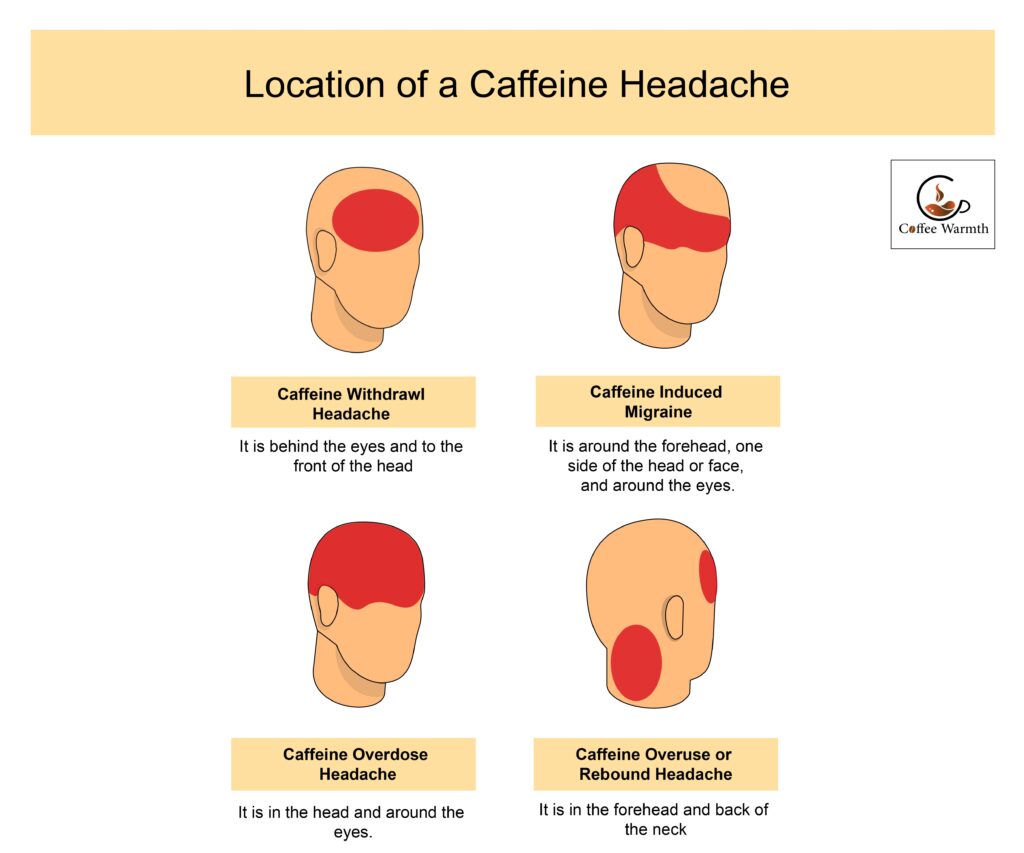
How Does Coffee Help with Headaches?
Coffee helps with headache by vasoconstriction of the cerebral blood vessels through blockade of adenosine receptors. Adenosine and purine are responsible for vasodilation of cerebral blood vessels in different types of headache.
Drinking coffee antagonizes the vasodilatory effect of purines and adenosine. Caffeine in coffee narrows the blood vessels and reduces blood flow to the brain. Reduced blood flow decreases pressure on the brain nerves decreasing the headache, as mentioned in a study published in Pharmacological Reviews Journal.
The figure shows how vasoconstriction due to coffee helps with headaches.
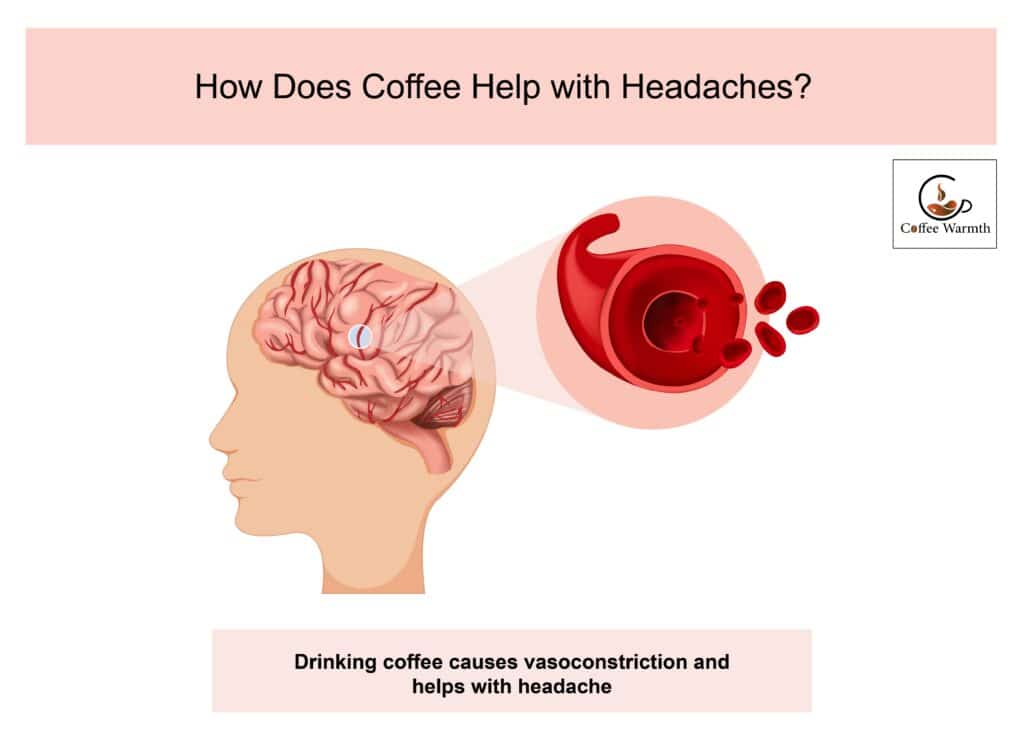
Maria Antonova, from Glostrup Hospital, in a study reports that caffeine in coffee inhibits prostaglandins and leukotrienes decreasing inflammation and pain perception of a headache.
100 mg to 300 mg caffeine in over the counter medication or 1-3 cups of coffee provide headache relief, as stated in a study “Caffeine in the management of patients with headache”.
Does coffee help with migraine?
Yes, coffee helps with migraines by decreasing the blood flow in cerebral blood vessels.
Migraines are triggered by high levels of purines which contain adenosine, a potent cerebral vasodilator, according to the studies published in Biomedicine & Pharmacotherapy Journal, The Medical Journal of Australia, and Cambridge University Press. Adenosine in purines leads to increased blood flow causing migraine attacks.
Caffeine in drinking coffee antagonizes adenosine causing vasoconstriction and relieving migraine. Drinking 1-2 cups (8-16 fl.oz.) of coffee limits headache frequency in patients with episodic migraines, as reported by a study in the Journal Nutrients.
Consuming 130 mg caffeine in combination with over the counter analgesic – acetaminophen relieves migraine headaches, according to a study in The Journal of Headache and Pain.
Does coffee help with tension headaches?
Yes, coffee helps with tension headaches. Caffeine provides an analgesic effect in tension headaches by antagonizing all types of adenosine receptors A1, A2A, A2B, and A3. Adenosine antagonism causes vasoconstriction of cerebral blood vessels relieving the pain and tightness in the head, scalp, or neck.
Drinking 1-2 cups (8-16 fl.oz.) of coffee or 200 mg caffeine intake with analgesic medications decreases the intensity of tension headaches, as stated by Richard B. Lipton M.D. from Saul R. Korey Department of Neurology. According to another study published in The Journal of Headache and Pain, consuming 130 mg caffeine with 500 mg acetaminophen provides analgesic effect in tension type headache.
Seymour Diamond MD, founder of the Diamond Headache Clinic in Chicago, and his colleagues found effects of caffeine in 301 people diagnosed with tension type headache. The results showed that caffeine and ibuprofen taken together reduces tension headache within 6 hours.
What Amount of Caffeine can trigger and treat a headache?
The amount of caffeine that can trigger a headache depends on the type of headache. Drinking more than 400 mg caffeine or 4-5 cups (32-40 fl.oz.) of coffee regularly is too much and can trigger overconsumption headache in normal individuals. However, the amount of caffeine that can trigger a headache in regular headache sufferers is 200 mg caffeine or 2-3 cups (16-24 fl.oz.) of coffee, according to the National Headache Foundation.
The amount of caffeine that can trigger migraine is 200 mg caffeine or 2-3 cups (16-24 fl.oz.) of drinking coffee regularly, states Magdalena Nowaczewska, from Nicolaus Copernicus University.
The amount of caffeine that can treat a migraine and tension type headache is 130 mg or 1-1.5 cups (8-12 fl.oz.) of coffee, as found in studies published in Clinical Pharmacology and Therapeutics and The Journal of Headache and Pain.
The image below illustrates amount of caffeine and coffee linked with both triggering and treatment of various headache types.
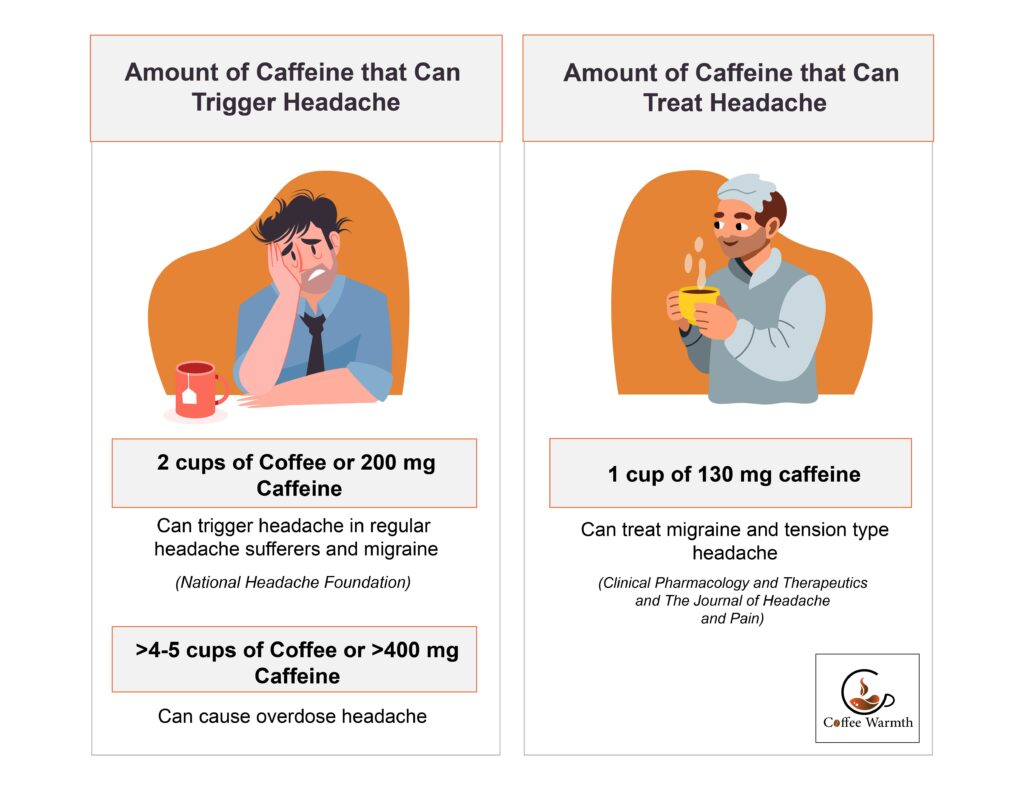
Can caffeine withdrawal cause headaches?
Yes, caffeine withdrawal can cause headaches. Caffeine in coffee causes vasoconstriction of cerebral blood vessels in regular consumers. Vasoconstriction has pain relieving effects as there is no pressure on surrounding brain nerves.
Caffeine withdrawal even for a day causes headache due to physical dependence and vasodilation occuring in the cerebral blood vessels. A study in the Psychopharmacology Journal highlights caffeine withdrawal headache and its severity in daily coffee drinkers.
Roland Redmond Griffiths, an American psychopharmacologist, and Laura Juliano from American University report in their study that headache incidence with caffeine withdrawal is 50%.
According to a study by John F. et al. caffeine withdrawal headaches start with a sensation of cerebral fullness 18 hours after the last caffeine intake. Cerebral fullness evolves rapidly into a diffuse, throbbing headache.
How long does caffeine withdrawal headache last?
Caffeine withdrawal headache lasts for two to nine days, according to Karima Sajadi-Ernazarova, MD from Drexel University College of Medicine.
The symptoms of caffeine withdrawal headache starts 12 to 24 hours after caffeine cessation and peaks between 20–51 hours, according to a study in the Journal Psychopharmacology.
How to get rid of caffeine headaches? (H3)
You can get rid of caffeine headaches in some of the following common ways according to medical professionals like John F. Greden, M.D. and Karissa N. Arca, M.D.
- Staying hydrated can cure caffeine induced headaches.
- Taking over the counter medications like ibuprofen, acetaminophen, and aspirin can relieve caffeine headaches.
- Following intermittent caffeine withdrawal in case of caffeine withdrawal headache can stop headaches.
- Applying an ice pack can treat caffeine headaches.
The graphic below lists abovementioned means to remove caffeine headaches in a pictorial way.
